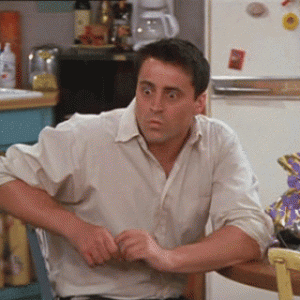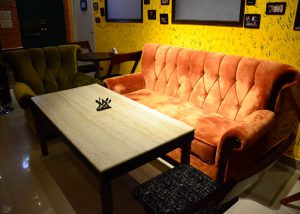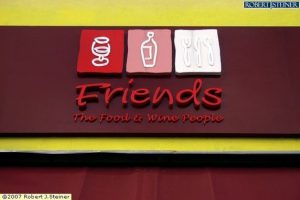In a dream come true for every crazed fan of the unforgettable 90’s TV show, it appears that two ‘F.R.I.E.N.D.S.’ themed ‘Central Perk’ cafes, both named after the soap, have popped up in Kolkata and Delhi – a development that has, needless to say, excited many. The owners have come up with a brilliantly unoriginal and yet, exceedingly profitable recipe for commercial success that’s going to have them making (and eventually losing) big money, all by feeding off of Friends’ junkies’ thriving nostalgia for the legendary show.
For the record, this isn’t the first time that someone’s tried to set up a TV show-themed eatery, nor the first time that someone’s kickstarted a restaurant conceptualised after the fictional coffee house (check out the ones in USA, Pakistan, Singapore, China, Denmark AND the UK! )
Interestingly enough, while they seem to have gone out of their way to get their cafes’ theme just about on point, it certainly looks as though they’ve thrown caution to the wind as far as NBC’s intellectual property rights (as producer of the sitcom) in the matter are concerned. Assuming the likely possibility that they haven’t acquired a trademark/copyright license or a publicity rights license, this post looks at the multiple IPR violations that the setting up of the restaurants could have resulted in.
The F.R.I.E.N.D.S. and F.R.I.E.N.D.Z. cafes : A Case of Infringement Served Three Ways
Copyright
 For those of you that find yourselves offended by the very possibility that copyright infringement is at play here, because of course the theme of a restaurant cannot possibly be copyrighted, I have news for you. What the theme here essentially implies is the concept/idea that defines the general ambience of the restaurant. Since ideas in themselves are not copyrightable, the same idea can be developed in a different manner – essentially implying that if the café merely possessed elements similar to those in the show without being distinctively identifiable as being so, there would have been no case for infringement. However, because the café’s expression of the idea is substantially similar to that of the show, such that through the incorporation of the characters and exclusive elements from the show as a part of its interiors and general set-up, it is basically a literal imitation of everything about the sitcom, it definitely amounts to a violation of NBC’s copyright. For instance, if inspired by the Harry Potter movie series, somebody started a bistro that had a wizard-themed set up, they wouldn’t be liable for infringing Warner Bros copyright just because the ideas behind the two were striking similar – however, if they used distinctive visual specifics (like a direct ‘Harry Potter’, ‘Hogwarts’ or ‘Voldemort’ reference) from the movies, it would necessarily constitute an infringement.
For those of you that find yourselves offended by the very possibility that copyright infringement is at play here, because of course the theme of a restaurant cannot possibly be copyrighted, I have news for you. What the theme here essentially implies is the concept/idea that defines the general ambience of the restaurant. Since ideas in themselves are not copyrightable, the same idea can be developed in a different manner – essentially implying that if the café merely possessed elements similar to those in the show without being distinctively identifiable as being so, there would have been no case for infringement. However, because the café’s expression of the idea is substantially similar to that of the show, such that through the incorporation of the characters and exclusive elements from the show as a part of its interiors and general set-up, it is basically a literal imitation of everything about the sitcom, it definitely amounts to a violation of NBC’s copyright. For instance, if inspired by the Harry Potter movie series, somebody started a bistro that had a wizard-themed set up, they wouldn’t be liable for infringing Warner Bros copyright just because the ideas behind the two were striking similar – however, if they used distinctive visual specifics (like a direct ‘Harry Potter’, ‘Hogwarts’ or ‘Voldemort’ reference) from the movies, it would necessarily constitute an infringement.
 What has happened here is exactly that. The cafes do not merely bear some sort of vague resemblance to the coffee shop and the characters in the TV show – both basically duplicate them, and rather explicitly, I must say. There’s the famed orange couch, Joey and Chandler’s big ugly dog statue, Phoebe’s pink bicycle, a picture of the words ‘Central Perk’ as they appear on the glass window of the the six’s fav coffee shop in the show, and of course, another of the cast with their umbrellas from the show’s theme song. And to top it off, a menu adorned with dishes named after the characters themselves! While the motive may have been noble – i.e. to offer F.R.I.E.N.D.S.-aficionados a chance to have coffee at Central Perk while the owners made a quick buck or two (or three) – in the absence of a legitimate license from NBC, all of these represent individual instances of copyright infringement, liable to action by the production house.
What has happened here is exactly that. The cafes do not merely bear some sort of vague resemblance to the coffee shop and the characters in the TV show – both basically duplicate them, and rather explicitly, I must say. There’s the famed orange couch, Joey and Chandler’s big ugly dog statue, Phoebe’s pink bicycle, a picture of the words ‘Central Perk’ as they appear on the glass window of the the six’s fav coffee shop in the show, and of course, another of the cast with their umbrellas from the show’s theme song. And to top it off, a menu adorned with dishes named after the characters themselves! While the motive may have been noble – i.e. to offer F.R.I.E.N.D.S.-aficionados a chance to have coffee at Central Perk while the owners made a quick buck or two (or three) – in the absence of a legitimate license from NBC, all of these represent individual instances of copyright infringement, liable to action by the production house.
Trademark
 The owners of the restaurants could, aside from copyright issues, could also find themselves having to fight off allegations concerning passing off. While the FRIENDS mark doesn’t look like it’s been registered in the country, NBC could easily rely on the principles of well known trademark and trans-border reputation to make its case. Even after the show went off air, ample merchandise continues to be sold by NBC under the ‘FRIENDS’ mark, further strengthening its position as a distinctive mark. A café named after the hit sitcom could inadvertently suggest that the two are intrinsically connected, and that the café’s existence has been sanctioned by the studio. It would appear that the twin restaurants, however, fall in neither of the two categories, unless one considers the unlikely probability that they’ve each managed to get their hands on a trademark license, paid the foresee-ably humongous license fees and thereafter separately established independent restaurants in the same country, one named ‘F.R.I.E.N.D.S.’ and the other, ‘F.R.I.E.N.D.S.’.
The owners of the restaurants could, aside from copyright issues, could also find themselves having to fight off allegations concerning passing off. While the FRIENDS mark doesn’t look like it’s been registered in the country, NBC could easily rely on the principles of well known trademark and trans-border reputation to make its case. Even after the show went off air, ample merchandise continues to be sold by NBC under the ‘FRIENDS’ mark, further strengthening its position as a distinctive mark. A café named after the hit sitcom could inadvertently suggest that the two are intrinsically connected, and that the café’s existence has been sanctioned by the studio. It would appear that the twin restaurants, however, fall in neither of the two categories, unless one considers the unlikely probability that they’ve each managed to get their hands on a trademark license, paid the foresee-ably humongous license fees and thereafter separately established independent restaurants in the same country, one named ‘F.R.I.E.N.D.S.’ and the other, ‘F.R.I.E.N.D.S.’.
It is worthwhile to note that because the word ‘FRIENDS’ is in itself a common dictionary term, capable of being trademarked only on account of the secondary distinctiveness that the word has come to acquire since the show first began airing, it is the use of the word as a ‘logo’ in the specific style that it appears on the show that would render it really worthwhile to pursue the claim.
For instance, check out the pictures below.
F.R.I.E.N.D.S. Cafe, Kolkata
On the left, you see the picture of a bistro in Singapore called ‘Friends – the Food and Wine people’. Despite the similar name, a suit against this place would make for a difficult case to win, considering the fact that there is no way to draw any direct link between the restaurant and the TV show. On the contrary, the ‘F.R.I.E.N.D.S.’ café in Kolkata, aside from being entirely conceptualised after the program, also uses an exact imitation of the friends’ show title and logo, making the case for passing off stronger.
By establishing that the F.R.I.E.N.D.S. logo is a well-known mark, that it possesses transborder reputation, and that the defendants’ use of the mark caused damage to its goodwill and reputation, NBC would be able to transcend the barriers posed by its non-registration as a trademark in the country. The Trade Marks Act only requires that the mark be recognised as well-known in at least one relevant section of the public – a fact that NBC shouldn’t have much trouble establishing at all. After all, what entrepreneur with an iota of business acumen would gamble on conceptualising an entire restaurant after a TV show unless they were convinced that their market identified with it?
Right of Publicity
Ordinarily, one would assume that because the actors in the sitcom aren’t playing themselves, but are instead enacting fictional characters created by another, the right of publicity is absent and all that remains is the copyright in the characters themselves, which is essentially vested in the show’s producer as the likely owner of the copyright. Which brings us back to the question – can actors at all claim publicity rights in the characters that they portray?
Two US decisions appear to answer this question. In McFarland v Miller, one of the issues considered involved the ascertainment of whether an actor had the right to challenge the unauthorized use of his on-screen name and image as it appeared in a movie series that he had starred in as a child. Holding in favour of the actor, the Third Circuit ruled that-
“Where an actor’s screen persona becomes so associated with him that it becomes inseparable from the actor’s own public image, the actor obtains an interest in the image which gives him standing to prevent mere interlopers from using it without authority……. A misappropriation took place in Allen and Price because the performers were identified with the image developed on-screen. Thus, the actor who developed the image had the right to exploit it as superior to third parties which had nothing to do with the actor or the character identified with the actor”.
Similarly, the Sixth Circuit in Landham v. Lewis Galoob Toys, Inc. held that “If the use of a fictional character also evokes the identity of the actor who played that character, he may challenge that use regardless of the fact that the actor’s personal notoriety was gained exclusively through playing that role”.
However, the California SC in Lugosi v. Universal Pictures issued a contradicting decision. This case looked at whether actor Lugosi had any proprietary interest in his individualistic portrayal of Count Dracula – a character that has been played by numerous artists over the decades. The Court held, “Merely playing a role under the foregoing circumstances creates no inheritable property right in an actor, absent a contract so providing”, and went on to assert that an actor retains proprietary interest in his character only in the case of an “original creation of a fictional figure played exclusively by its creator”. In considering this judgement, it is worthwhile to take into account the fact that this instance dealt exclusively with the enactment of a character whose essence had already been set in stone by the actors that preceded Lugosi, and hence there was perhaps little that he could possibly add to the portrayal of his own persona. With the F.R.I.E.N.D.S. cast, the case is entirely different – the characters of Rachel Green, Ross Geller, Phoebe Buffay, Joey Tribbiani and Monica Geller have been inextricably intertwined with the persona of the actors that have played them, thanks to the major hit that the ten-season long series went on to become, so much so that neither of the six cast members seem to have been able to get away from the ghosts of their iconic on-screen characters that continue to haunt their Hollywood careers.
It is thus, safe to say, that the setting up of the two Friends themed restaurants in the country is very much a violation of NBC’s rights, with the owners being seriously susceptible to legal action worth gazillions of dollars.
As Chandler Bing would say, could they BE in any more trouble?

